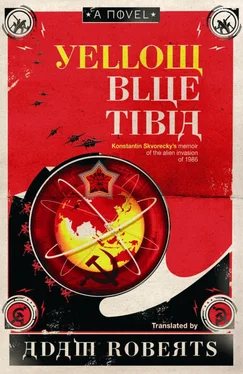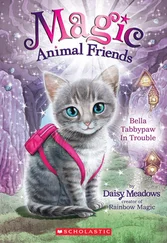We wrote detailed accounts of alien atrocities. We had them villainously blowing up a city — New York, as a first choice. This was Rapoport’s idea; that the main island upon which New York stands (what was its name? we wondered. Nobody had the courage to ask Malenkov to supply us with an encyclopaedia that might answer such a question — Brooklyn Island said Kaganovich, Manhattan Island said Asterinov, Long Island said I) would be exploded by a diabolic alien death ray. Then we had second thoughts, for such a stunt, we reasoned, would be hard to fake; and if the Red Army were actually to bombard New York into dust and shards then we would have been the authors of mass death. So then we toyed with the idea of aliens attacking Siberia; some remote and inaccessible place where the story could not easily be falsified. But Asterinov voiced the obvious objection. ‘Our brief is to unite humanity against this monstrous alien foe!’ he said. ‘Why should humanity care if these aliens blow up a few trees in Siberia?’
‘We need a compromise,’ I suggested. ‘Somewhere close enough to civilisation to be threatening, but not so close as to be easily falsified. Eastern Europe?’
‘Germany,’ said Rapoport. ‘Let us have them erase Germany entirely. Turn that portion of central Europe into a blasted desert of polished and scorched glass.’
‘A little impracticable, in terms of faking the scenario,’ said Rapoport.
Nikolai Nikolaivitch only scowled.
‘Somewhere else,’ I suggested. ‘Ukraine, maybe. Latvia, perhaps. Let’s decide that later.’
‘The Ukraine has been almost depopulated,’ agreed Frenkel. ‘What with the famine, and then the war. Let us have the aliens blow up some portion of the Ukraine. That would be the best option.’
How could we plan such monstrosity so very casually? This is not an easy question to answer, although in the light of what came later it is, of course, an important one. Conceivably it is that we did not believe, even in the midst of our work, that it would come to anything — that we felt removed from the possible consequences of our planning. But I suspect a more malign motivation. Writers, you see, daily inflict the most dreadful suffering upon the characters they create, and science fiction writers are worse than any other sort in this respect. A realist writer might break his protagonist’s leg, or kill his fianc’e; but a science fiction writer will immolate whole planets, and whilst doing so he will be more concerned with the placement of commas than with the screams of the dying. He will do this every working day all through his life. How can this not produce calluses on those tenderer portions of the mind that ordinary human beings use to focus their empathy?
6
The house had electricity, but the supply was intermittent. We worked in the afternoon in groups of two or three, or off by ourselves; and then we worked as a whole group in the evening by the light of oil lamps, tulip-shaped bulbs of brightness, orange as summer blooms. There would be three or four lamps placed upon the table, hissing quietly as if in disapproval of our work.
In the mornings there was a spring quality to the sunlight; a freshness. On one such day I walked in the garden with Nikolai, the two of us smoking earnestly. The brightness coming through the trees freckled the lawn with paler greens. Nikolai found a wooden soldier, a foot tall, in amongst the unmown grass, over by the shrubbery. It had once been bright with blue and yellow paint, but its time out in the open had blistered and stripped most of its colour off, and the wood beneath was damp and dark and crumby. ‘I wonder who left this here,’ I said. ‘I wonder for how long they wept for their lost toy! I wonder if it was quickly replaced.’
‘I wonder if they’re still alive,’ said Nikolai.
He tossed the thing into the foliage.
‘Konstantin,’ Nikolai said. ‘I have something to tell you.’
‘Yes?’
‘I have not written anything in a decade. Longer.’
‘Nonsense,’ I said. ‘ Dark Penguin. The Grasshopper Lies Heavy. The Vulture is Moulting . Superb books. And what about that series about the man who could breathe under water?’
‘A French book, little known, and, I think, illegal here. L’Homme qui peut vivre dans L’eau . I simply translated it into Russian, purging it of bourgeois details and adding a few standard Russian touches. The same with the others. Though those were American, rather than French. I changed the titles, of course; and I was secretive. Who would want to be discovered in possession of an American novel?’ He shrugged. ‘I am a fraud. I can’t pull my weight.’
This was strange news. ‘Don’t worry’, I said, a little uncertainly.
‘I am very afraid of disappointing the Comrade General Secretary. I was in the army. I understand how… unmerciful authority… needs to be.’ His hand, I saw, was shaking as he lit a new cigarette.
‘I was in the army too,’ I said. ‘We were all in the army, Nikolai.’
‘Where were you posted?’
‘Moscow. Then Latvia, Estonia, the west.’
‘Moscow?’
‘I,’ I said, with a little tremor of remorse in my heart, ‘know.’
‘I suppose,’ he said, in a slow voice, ‘somebody had to be stationed in Moscow. Were you on the general staff?’
‘God, no. I was a regular soldier. Like you. And I saw plenty of fighting too, later on. In Latvia. The Nazis fought like hounds. Their lives at stake, of course. All my friends died; and then I made new friends, and they all died, and…’ I stopped. The wind moved between us and around us. The sun glared at us out of a petrol-blue sky. The shadows of the trees shuddered. ‘Well, you know all about that,’ I said.
‘Yes.’
We sat in silence, smoking.
‘When I was a young boy,’ I told Asterinov (I was telling him something I had shared with nobody since), ‘I saw a red-haired man selling chestnuts in a market square.’ Asterinov looked at me. ‘I thought that red-haired man was Death,’ I said. ‘I still do. I still think that Death is a red-haired man.’
‘Isn’t he supposed to come in a black cloak and have a skull for a face?’ This, of course, was how Asterinov’s imagination worked; and it was how most people’s imaginations work. They tap into the general well, which sometimes we call clich’. It is a weakness, but in another way it is a greater strength than any to which I have ever had access. It was what he had summoned his courage to tell me, I suppose, that day: my imagination is the common imagination, comrade, he was saying; and I have drawn on the imaginations of others to write my books.
‘You’re quite right,’ I said. ‘A skull. Not a redhead. I was a foolish child, I’m afraid, and I have carried this foolishness into adult life. Death — a red-haired man?’
We sat in silence for a further minute, or so.
‘Comrade,’ I said. ‘There is no need for the General Secretary to be bothered with any irrelevant details.’
‘He singled me out, that first day, to tell me how much he liked Starsearch .’
‘He said he’d blocked the motion picture.’
‘But he liked the novel! What if he pays close attention to me — to my contribution? What if he finds out?’
‘Comrade,’ I said. ‘Calm yourself, please. Find out what? This is a collective project. Literature,’ I went on, ‘has always been a collective activity. Writers adapting plots from other writers, sharing ideas and characters and images, all the way back to Homer. Shakespeare didn’t invent a single one of his plots. You have nothing to be ashamed of. Your works have been an inspiration to the Soviet people in the great war. And, and,’ I stopped. ‘ Starsearch too?’ I asked, in a sorrowful voice.
Читать дальше












